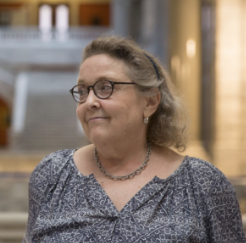An awkward silence accompanied the Kentucky House of Representatives’ passage of HB 80 by a vote of 94-0 on January 24.
Sponsored by Rep. Kim Banta, HB 80 creates a new exception to the open records law for names and likenesses of winners of Lottery prizes — in any amount and for all time — if the winner requests anonymity. It creates a corresponding prohibition on release of names and likenesses in the laws governing the Lottery Corporation found in Chapter 154 of the Kentucky Revised Statutes.
Banta’s unsuccessful effort to ensure anonymity for Lottery prize winners in 2023 began with a $7 million dollar threshold and extended protection for one year. It passed in the House — with a committee substitute that lowered the monetary threshold to $1 million — but failed in the Senate.
2024’s HB 80 underwent even more dramatic change before it passed out of the House Licensing, Occupations, & Administrative Regulations Committee on January 17.

Amye Bensenhaver
The $1 million dollar threshold in the original bill was expanded, by committee substitute, to any lottery prize in any amount. The one year restriction was lifted.
As we noted in analysis written shortly after HB 80 sailed through committee, “[t]he original bill was, at worst, redundant. It tracked identical protection in corresponding Lottery Corporation legislation. It arguably promoted a valid public purpose, shielding winners from unwelcomed intrusions in the one year period after luck smiled on them. Its impact, we reasoned, would be minimal, given the limited number of $1,000,000 lottery winners and one year duration of the protection.”
Moreover, we later commented, “the Lottery Corporation already maintains the anonymity of prize winners who request that their names and likenesses not be disclosed. The impact of HB 80 — which seems likely to become law in 2024 — is to codify the Lottery Corporation’s current practice and establish an exception to authorize denial — KRS 61.878(1)(t) if you are counting — in the event the Lottery Corporation receives an open records request.
Our objections to the radical changes to Banta’s original bill focus less on substance and more on process. Unless there is an unlikely spate of suspicious Lottery prize winners — prompting concern about the legitimacy of the games — the impact of the new exception on the public’s right to know will be a great deal less than seismic.
No. Our objection to HB 80 is to the failure of the House to even casually vet it.
The passage of a new exception to the open records law was once attended by serious legislative review and policy consideration. For example, several years passed after the 9/11 terrorist attacks before all stakeholders could agree to a homeland security exception. That exception, enacted in 2005, is found at KRS 61.878(1)(m). It is a testament to the legislative effort that went into hammering out stakeholder differences and languaging an exception that would not lend itself to abuse.
Was this process a better one than the current process of mindlessly and reactively plugging nonexistent holes in the open records law?
The answer is an unequivocal “yes.”
Consider another example: the enactment in 2021 of an exception for “photographs or videos that depict the death, killing, rape, or sexual assault of a person.” Cited as the Bailey Holt-Preston Cope Victims Privacy Act, the new exception was prompted by parental concerns about student privacy following the Marshall County High School mass shooting in 2018. We unsuccessfully attempted to convince the sponsor that the existing privacy exception to the open records law protects “gruesome photos and videos” — except for cases in which they expose failures in agency response (such as those exposed in the Uvalde mass shooting), or an agency “bad actor” (such as Minneapolis police officer Derek Chauvin) and, then, only after proper redaction to protect victim privacy. He ignored our questions.
But with no policy consideration or discussion, HB 80 was unanimously adopted by the House of Representatives on January 24. No one asked:
• One or the other of the proposed statutory revisions in HB 80 is redundant. Why the need for statutory redundancy?
• Why the dramatic shift from $7 million prizes to $1 million prizes, as proposed in 2023 and 2024, to prizes of any trifling amount?
• Why the decision to provide permanent protection to names and images rather than one year’s protection as proposed in 2023 and 2024?
• What policy are we seeking to promote and is that policy advanced by permanent secrecy at the request of winners of prizes — great and small?
HB 80 is not an open government hill to die on, but these questions should be answered before the Senate votes on it.
More importantly, legislative haste in its passage suggests a troubling indifference to new laws that abridge existing statutory protection for the public’s right to know.
This, or any other amendment to the open records or meetings laws, should proceed only after careful legislative consideration and proper vetting — lest the public “repent in leisure.”
Amye Bensenhaver is a retired Kentucky assistant attorney general who wrote open records and open meetings decisions for 25 years. She is co-founder and co-director of the Kentucky Open Government Coalition.
















